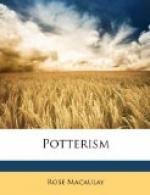‘I’ve told you what I think,’ said Juke bluntly. ’I can’t do any more. It’s your own show.’ He took out his watch. ‘I’ve got a Men’s Social,’ he said, and went. That is so like parsons. Their conversations nearly always have these sudden ends. But I suppose that is not their fault.
5
And, after all, Juke was right. Juke was right. It was love, and I was in it, and so was Jane. Five minutes after Juke left me that night I knew that. I had been in love with Jane for years; perhaps since before the war, only I had never known it. On that Anti-Potter investigation tour I had observed and analysed her, and smiled cynically to myself at the commercial instinct of the Potter twins, the lack of the fineness that distinguished Katherine and Juke. I remembered that; but I remembered, too, how white and round Jane’s chin had looked as it pressed against the thymy turf of the cliff where we lay above the sea. All through the war I had seen her at intervals, enjoying life, finding the war a sort of lark, and I had hated her because she didn’t care for the death and torture of men, for the possible defeat of her country, or the already achieved economic, moral, and intellectual degradation of the whole of Europe. She had merely profiteered out of it all, and had a good time. I remembered now my anger and my scorn; but I remembered too the squareness and the whiteness of her forehead under her newly-cut hair, that leave when I had first seen it bobbed.
I had been moved by desire then without knowing it; I had let Hobart take her, and still not known. The pang I had felt had been bitterness at having lost Jane, not bitterness against Jane for having made a second-rate marriage.
But I knew now. Juke’s words, in retrospect, were like fire to petrol; I was suddenly all ablaze.
In that case Juke was right, and we mustn’t go on meeting alone. There might be, as he said, the most ghastly mess. Because I knew now that Jane was in love with me too—a little.
We couldn’t go on. It was too second-rate. It was anti-social, stupid, uncivilised, all I most hated, to let emotion play the devil with one’s reasoned principles and theories. I wasn’t going to. It would be sentimental, sloppy—’the world well lost for love,’ as in a schoolgirl’s favourite novel, a novel by Leila Yorke.
Now there are some loves that the world, important though it is, may be well lost for—the love of an idea, a principle, a cause, a discovery, a piece of knowledge or of beauty, perhaps a country; but very certainly the love of lovers is not among these; it is too common and personal a thing. I hate the whole tribe of sentimental men and women who, impelled by the unimaginative fool nature, exalt sexual love above its proper place in the scheme of things. I wasn’t going to do it, or to let the thing upset my life or Jane’s.
6
I kept away from Jane all that week. She rang me up at the office once; it may have been my fancy that her voice sounded strange, somehow less assured than usual. It set me wondering about that last lunch and afternoon together which had roused Juke. Had it roused Jane, too? What had happened, exactly? How had I spoken and looked? I couldn’t remember; only that I had been glad—very glad—to have Jane back in town again.




